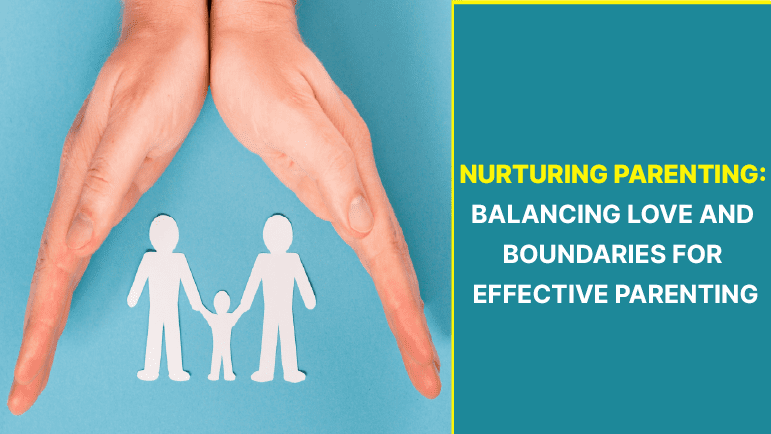Introduction
Parenting is a journey that requires you to walk the tightrope of nurturing children and maintaining discipline. This of course is easier said than done. There are many parenting books and suggestions around. They all have their viewpoints on the best practices of raising children. But one thing they all agree on is that parenting, which focuses on creating a warm and caring environment while setting appropriate limits, is highly effective in raising well-rounded children. Today we explore the concept of nurturing parenting and provide strategies for achieving a healthy balance between love and boundaries.
Understanding Different Types of Parenting
Every parent is unique, so your parenting practices are bound to differ from others. However, psychologists who have studied parenting have been classifying parenting into specific categories based on common practices of parents. Of these, the most famous psychologist was Baumrind who introduced three parenting styles based on how much control parents asserted over children. Later, Maccoby and Martin expanded on this and added the dimension of responsiveness of parents to the child’s needs. This gave rise to the four dominant parenting styles that exist today [1].
Authoritative Parenting
Now this is what researchers and scholars consider the ideal style of parenting. Authoritative parents are warm, nurturing, and responsive to their children’s needs but they also set clear and reasonable expectations from children. When children are facing challenges, these parents provide guidance and support but keep encouraging independence and individuality [1].
Authoritarian Parenting
These are the strict parents. Authoritarian parents are highly demanding of their children. They set rules and expect children to follow but are rarely responsive to their child’s needs. Obedience and discipline become valued and negotiations become a sign of truancy. Consciously or unconsciously, their communication is one-way and little to no consideration is given to child’s perspective [1].
Read this article difference between authoritative parenting and permissive parenting.
Permissive Parenting
In the child’s eye, these are “cool” parents. But technically, permissive parents are opposite of the previous category. Permissive parents tend to be nurturing and indulgent toward their children and set very few rules or boundaries. They want to be their child’s friend and forget the role of a parent [1]. Many times, children of permissive parents become too demanding and start calling the shots in the house, controlling their parents instead of the other way around.
Uninvolved Parenting
At times parents are absent, despite being physically present. When parents are unresponsive to the needs of their children, are emotionally distant, and provide minimal guidance, it is termed as uninvolved parenting. This can occur for various reasons, such as demanding professional work, or some mental or physical health concern in the parent [1].
Role of Love and Nurturing in Parenting
Shelja Sen, the author of the famous parenting book “All you need is love,” terms connection and bond with the child as the basis of parenting [2]. Through love and nurturing, parents form the foundation for a healthy and supportive relationship. It is this relationship, along with nurturing behaviors and active expressions of love, that becomes crucial in children’s emotional, social, and cognitive development [2].
Simply put, nurturing parenting involves meeting a child’s physical, emotional, and psychological needs; providing comfort and protection; and promoting independence and self-confidence [3]. When children feel loved, they are more likely to have positive self-esteem and are able to acquire the ability to form secure relationships.
Yet, you must be careful not to take love to the extremes. Sometimes parents can become so focused on providing autonomy and nurturance that they end up becoming permissive. They provide no structure and easily give in to their demands. This can eventually become harmful for children. Researchers have noticed that children with permissive parents have poor emotional regulation, poor self-discipline, behavior problems, and high risk-taking tendencies [4] [5].
Role of Boundaries in Parenting
Boundaries in parenting can help in providing structure and a sense of security for children. When parents set appropriate boundaries their children develop self-discipline and responsibility [5]. This is not always easy and children definitely resist. But it is important that parents stay firm in the necessary boundaries. For instance, a boundary such as a fixed bed-time might initially be a crisis from the child’s perspective and the child will protests, but eventually, it will help in creating sleep hygiene and routine for the child.
Again, the word of caution again becomes do not take this to the extreme. When parents become too strict in their boundaries they can lose out on the nurturance and become authoritarian. In such situations, while boundaries are clear and well-established, there is little negotiation and flexibility. Children growing up in this environment also face considerable developmental issues. For instance, they may develop into adults with poor social skills, low self-esteem, a higher likelihood of mental health issues, and a higher likelihood of rebellious behavior [5] [7].
Striking a Balance Between Love and Boundaries when Nurturing Parenting
Parents who understand and practice the authoritative parenting style where both boundaries and nurturance are there, will have better relations with their children in the future. This type of parenting also has many positive outcomes for children like high self-esteem, academic success, better emotional regulation, and more independence in decision-making. So all in all, it is worth the effort.
More information – How do parenting style affect children.
Following are some tips to create this balance and develop a positive parenting style [3] [8] [9]:

Be Warm and Responsive
Developing a connection with the child is of utmost importance. You must learn to demonstrate warmth, and affection towards your children in a way that they understand. Some ways you can do this is by responding promptly and sensitively to the child’s emotional and physical needs; offering praise or encouragement for their efforts; and accepting the child’s abilities and personality.
Encourage Open Communication
You can create a psychologically safe environment for the child by encouraging open communication and listening to the child in a non-judgemental manner. In such an environment the child will feel comfortable expressing their thoughts and feelings [10].
Establish Clear and Reasonable Expectations
Communicating your expectations to the child, including rules, responsibilities, and consequences, can help set boundaries. You must ensure that these expectations are age-appropriate and fair. For instance, expecting a 13-year-old to do self-study for 1 hour might be a fair expectation but for a 7-year-old, this rule might be unfair. Further, explaining the need for these boundaries to children is also important. This can invite more collaboration and accountability on part of children.
Practice Positive Discipline
Instead of relying solely on punishment, emphasizing positive discipline techniques such as allowing the child to manage the outcome of a situation they caused. For example, if a child spills water one way to increase responsibility is to ask the child or even help the child to clean it. Positive discipline strategies encourage problem-solving and reflection rather than resorting to harsh punishments.
Foster Independence and Autonomy
As children grow old, you as parents need to start giving up some control. Supporting the child’s growing independence by gradually granting age-appropriate responsibilities and decision-making opportunities is essential. For example, as children enter teenage years, extending their bed-time, encouraging them to make their own routine, or allowing them independent excursions with friends can help teach responsibility.
Conclusion
Parenting is tough and effective parenting is tougher. The best parenting practice is to balance between both nurturant love and reasonable demands. Without your warmth and affection, children might become distrusting of you and the world, and without boundaries, they may engage in truancy. If you are able to achieve this balance of authoritative parenting, you will be creating a sense of security, self-confidence, and responsibility in children.
If you are a parent or are planning parenthood, you can learn more about effective parenting practices from our experts at United We Care. Our team of dedicated professionals is committed to providing you with the best solutions for the overall well-being of you and your family.
References
- L. G. Simons and R. D. Conger, “Linking mother–father differences in parenting to a typology of family parenting styles and adolescent outcomes,” Journal of Family Issues, vol. 28, no. 2, pp. 212–241, 2007. doi:10.1177/0192513×06294593
- S. Sen, All You Need Is Love: The Art of Mindful Parenting. New York: Collins, 2015.
- D. Baumrind, “Effects of authoritative parental control on child behavior,” Child Development, vol. 37, no. 4, p. 887, 1966. doi:10.2307/1126611
- G. A. Wischerth, M. K. Mulvaney, M. A. Brackett, and D. Perkins, “The adverse influence of permissive parenting on personal growth and the mediating role of emotional intelligence,” The Journal of Genetic Psychology, vol. 177, no. 5, pp. 185–189, 2016. doi:10.1080/00221325.2016.1224223
- S. M. Arafat, H. Akter, M. A. Islam, Md. M. Shah, and R. Kabir, “Parenting: Types, effects and cultural variation,” Asian Journal of Pediatric Research, pp. 32–36, 2020. doi:10.9734/ajpr/2020/v3i330130
- C. Connel, “Multicultural perspectives and considerations within structural family …,” RIVIER ACADEMIC JOURNAL, VOLUME 6, NUMBER 2, FALL 2010, https://www2.rivier.edu/journal/ROAJ-Fall-2010/J461-Connelle-Multicultural-Perspectives.pdf (accessed Jun. 9, 2023).
- P. S. Jadon and S. Tripathi, “Effect of Authoritarian Parenting style on self esteem of the Child: A Systematic Review ,” IJARIIE-ISSN(O)-2395-4396, vol. 3, 2017. [Online]. Available: https://citeseerx.ist.psu.edu/document?repid=rep1&type=pdf&doi=1dbe3c4475adb3b9462c149a8d4d580ee7e85644
- L. Amy Morin, “Strategies that will help you become more authoritative to your kids,” Verywell Family, https://www.verywellfamily.com/ways-to-become-a-more-authoritative-parent-4136329 (accessed Jun. 9, 2023).
- G. Dewar, “The authoritative parenting style: An evidence-based guide,” PARENTING SCIENCE, https://parentingscience.com/authoritative-parenting-style/ (accessed Jun. 9, 2023).
- “Parenting: 5 Tips To Have Open Communication With Your Child,” United We Care, https://test.unitedwecare.com/parenting-5-tips-to-have-open-communication-with-your-child/.





